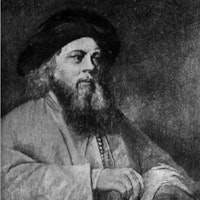Pray Continually
Topic: Prayer, Meditation, & Contemplation
Do not pray for a thing that you lack, for your prayer will not be accepted. Rather when you wish to pray, pray for the heaviness that is in the Head of the world. For the want of the thing that you lack is [a want] in the indwelling Glory. For man is a part of God, and the want that is in the part is in the whole, and the whole suffers the same want as the part. Therefore let your prayer be directed to the want of the whole. Pray continually for God’s glory that it may be redeemed from its exile.
Israel ben Eliezer, more commonly known as the Baal Shem Tov or Besht, was born around 1700 and is celebrated as a seminal figure in Jewish mysticism. Rising from humble beginnings, his charismatic teachings reshaped the spiritual landscape of Eastern Europe, laying the foundation for Hasidic Judaism. His life's work revolved around promoting spirituality through joyous religious observance and fervor, countering the more scholarly approach prevalent during his time. He employed stories, parables, and a deep understanding of the Kabbalah, Jewish mysticism, to bring about a spiritual renaissance.
Baal Shem Tov's teachings emphasized a personal relationship with God, the inherent holiness in all aspects of life, and the idea that the divine can be found in the simplest of things. He famously said that everything in the world, even a leaf falling from a tree, is part of a divine plan. The Besht's mystical approach resonated with the Jewish masses, who may have found traditional Talmudic studies inaccessible. His legacy was the birth of Hasidism, a movement characterized by its emphasis on mysticism, spirituality, and joyous service to God.
The influence of the Baal Shem Tov has not only permeated centuries but has also touched contemporary luminaries. Rabbi Jonathan Sacks, the former Chief Rabbi of the United Hebrew Congregations of the Commonwealth, frequently drew upon Hasidic teachings in his work, indicating a clear influence from the Besht. Additionally, Rabbi Adin Steinsaltz, an internationally regarded scholar and educator, wrote extensively on the Talmud and Kabbalah while highlighting the essence of the Baal Shem Tov's teachings in his spiritual approach. Thus, the teachings of Israel ben Eliezer continue to inspire and guide many in their spiritual journey.
Wilson, Andrew, editor. World Scripture II. Universal Peace Federation, 2011, p. 309 [Israel Baal Shem Tov].

Israel Baal Shem Tov
Theme: Prayer


Short Commentary About This Israel Baal Shem Tov Passage
Long Commentary About This Israel Baal Shem Tov Passage
Additional Israel Baal Shem Tov Quotes
Resources
Related Quotes
Copyright © 2017 – 2026 LuminaryQuotes.com About Us